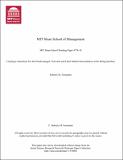Creating Connections For the Disadvantaged: Networks and Labor Market Intermediaries at the Hiring Interface
Author(s)
Fernandez, Roberto M.
DownloadCreating the Connection for Sloan.pdf (854.3Kb)
Metadata
Show full item recordAbstract
Scholars interested in race inequality have been particularly attracted to network accounts of the
stratifying effects of social networks in the labor market. A recurring theme in policy‐oriented research on poverty
is that institutional connections can be engineered to create connections between job seekers and employers in
ways that parallel social network processes. Yet, there has been little empirical research on how such linkages
work across the various steps of the recruitment, screening, and hiring process. We examine how labor market
intermediaries can serve as functional substitutes for social network processes for disadvantaged workers.
Consistent with policy arguments about the desirability of creating connections to employers, applicants who are
connected to this employer via formal labor market intermediaries exhibit a number of the advantages
experienced by those applying to the firm via social network ties. Across the two stages of the hiring process, the
net result is that applicants with such “created connections” are more likely to be offered jobs, and ultimately
hired than other groups of applicants. We conclude with a discussion of the implications of these findings for
research on labor market intermediation and other forms of brokerage and the feasibility of policy efforts to
“create connections” in the labor market.
Date issued
2010-03Publisher
Cambridge, MA; Alfred P. Sloan School of Management, Massachusetts Institute of Technology
Series/Report no.
MIT Sloan School of Management Working Paper;4778-10
Keywords
intermediaries, brokerage, networks, poverty, Race